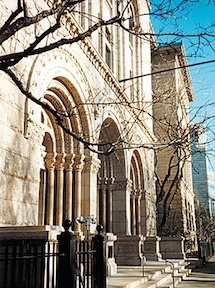By Theodore Nollert
A remarkable program celebrates its 50th anniversary this year: The Associated Colleges of the Midwest Newberry Seminar. A semester-long engagement designed to place young researchers at the center of a lively community of scholars, with access to the personal and informational resources of a major research library, the Newberry Seminar is the only program of its kind in the United States.
Brad Hunt, vice-president of Research and Academic Programs at the Newberry Library, said, “It’s rare for an interdisciplinary undergraduate program like the ACM Newberry Seminar to last fifty years.” He attributes the program’s success to the fact that students’ mentors “take students seriously and have high expectations.” “We immerse them in the life and work of a research library,” Hunt added, “and demand that they engage in scholarship.”
The Newbery Seminar has produced a sizable cohort of alumni in 50 years, many of whom gathered at the Newberry Library this fall to celebrate their experiences and the program’s success.
One veteran teacher of the seminar, Jim Diedrick, who taught in 1993-94 and 2000-01, described the seminar as an “uncommon community of uncommon communities.” Lawrence Towner, one of the Newberry’s past presidents, called the library itself “an uncommon collection of uncommon collections,” Diedrick recollected, and said his classes contained “some of the best students I have ever had the privilege of teaching.” He described the Newberry and its staff as “a kind of Platonic Ideal of intellectual engagement and the pursuit of knowledge for its own sake.”
Marcy Sacks and Ian MacInnes of Albion College, the current faculty mentors teaching the program, expressed similar desires to engage with a certain kind of student. “I have wanted to teach the Newberry Seminar since I first learned about it upon arriving at Albion College in 1999,” said Sacks. She described the Newberry Library as “a scholar’s heaven” and remarked that “the idea of teaching a group of highly motivated students who were especially eager and enthusiastic about humanities research” had a strong appeal. The students were also the primary draw for MacInnes, who was enthusiastic about the “new challenge in teaching a group of very engaged students who spend the semester focused entirely upon one seminar and one research project,” he said.
The experiences of the Newberry’s alumni demonstrate how deep scholarly engagement in a supportive intellectual community prepares the beneficiaries for diverse career paths, both within and outside of academia. At the seminar’s reunion, many of the alumni shared what they had learned.
Paul Boyer, a professional photographer who leads tour groups in Italy, said the seminar taught him “to encounter the unknown and break it into bite-sized pieces.” The seminar also stimulated his interest in Renaissance literature, academic works, and language, which allowed him to share a “love of Italy and Italian language with many people,” Boyer added.
In a similar remark, Lois Overbeck said what she “learned about learning” at the Newberry had the greatest influence on her. “We learned to listen here. We learned to listen to our doubts, and to do something about our doubts. We learned to hold open questions. We learned to say that we don’t know, unless we have evidence to back it up,” she explained.
Seminar alumna Nanette Johnson said, “The in-depth pre-Shakespearean work I did at the Newberry gave me the resources I needed to reach everyone from the ‘knuckleheads’ to the ‘gifted’ when we studied Shakespeare’s work in my English and drama classes in southwest Virginia.” Shakespeare was “unfailingly the most memorable and most-loved unit” taught in her classes, she said.
Remembering her time as a student in the seminar, Ruther Steiner said a trip “to one of Chicago’s company towns and thinking about individual, community, and society” still influences her work today. Steiner is now a professor of urban planning.
Elaine Bearden (ΦBK, Wesleyan University, 1993) recalled, “I loved looking through primary source materials, but I realized I wanted more connection with people and public service.” Since becoming a librarian, she has engaged in a number of projects, most recently “collaborating with a community organization to offer storytelling opportunities for disadvantaged youth,” she said.
Summing up what motivates many of the seminar’s students, Brenda Berkman commented, “I really wanted to do my own thing. And I thought here I could do independent research, and be in a colloquial setting that was just fabulous for me.”
“I could never have imagined the great circumstances I would land in,” Berkman added. “The Atlas of Early American History bicentennial project was here, and after getting a student job, the co-editors of the atlas, Lester Cappon and Barbara Bartz Petchenik (both now deceased) became mentors and life-long friends.”
Although her work led to a job offer from St. Olaf College and a very generous fellowship to pursue a master’s and PhD, Berkman decided to go in another direction. “I got a law degree, practiced law for a few years, and then sued the New York City Fire Department and became the first female firefighter in New York City,” she said.
These alumni are only a fraction of all those who were, in some way, shaped by the Newberry Seminar. The broad variety of career paths followed by past participants is a clear testament to the capacity of the liberal arts to prepare students for life, not just for a profession.
Theodore Nollert is a senior at Rhodes College in Memphis, Tennessee, studying English Literature. Rhodes is home to the Gamma of Tennessee Chapter of Phi Beta Kappa.




